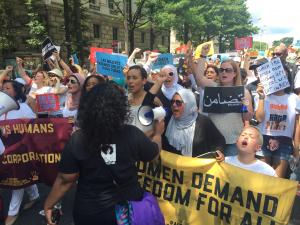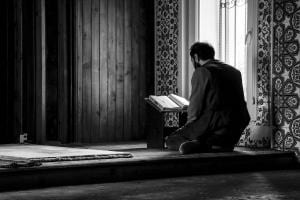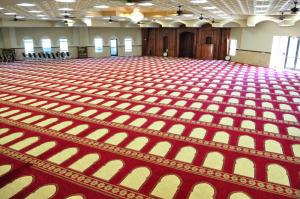
So I recently read an article entitled It’s Time to Boycott Saudi Arabia. In it the author proposes Muslims boycott Hajj and Umrah.The below is the core of the text of the blog post:
“It is time to boycott Saudi Arabia. Stop visiting the country for umrah (optional pilgrimage) and hajj (obligatory pilgrimage). Such a call is indeed draconian and may even sound like contravening fundamental religious obligations. But the Quranic ideal of justice commands Muslims to take a stand, even at great discomfort to self-interest.
O ye who believe! stand out firmly for justice, as witnesses to Allah, even as against yourselves, or your parents, or your kin, and whether it be (against) rich or poor: for Allah can best protect both. Follow not the lusts (of your hearts), lest ye swerve, and if ye distort (justice) or decline to do justice, verily Allah is well-acquainted with all that ye do. (Quran 4:135).”
I honestly have no idea where to even start in just how baffled I am by this proposal. From a religious perspective: we’re seriously proposing boycotting a religious duty? From a practical level—let’s say the so-called boycott was implemented how large of a percentage are Muslims living in the West (Europe, the United States and Canada) out of the almost 1.8 billion Muslims in the world?–do we seriously think that would even make a dent in the income of the Saudi Arabian government and its economy?
Ok, so let’s put those points aside and get to the core of the discussion. Why is it as a community our only mode of political action is boycotts? Why is it if we don’t like something we immediately cut-off (an individual/group) or boycott? Economic boycotts are effective if and only they are tied to an overall strategic end goal. Economic boycotts or suggestions of economic boycotts are seriously the weakest form of political action. This is illustrated by the Civil Rights Movement in the 1960’s. The African American community didn’t just protest and boycott—they also were effective in engaging elected officials to change policies of discrimination. The fight for civil rights is far from over, but the way they were able to change policies was truly what caused the needle to move in the right direction for civil rights for not just the African American community, but other minorities including Latinos and Muslim Americans.
The Muslim American community for far too long has been caught up in soft-advocacy (awareness campaigns, photo ops with politicians, Facebook posts, blogs, Tweets, hashtag campaigns, etc.) and often times this soft-advocacy is done in an echo chamber with no real way of impacting real change on a larger scale. Having worked with and in national level Muslim American organizations I’ve observed this first hand just how ineffective our advocacy is at a national level and just how weak politically our community is when it comes to political action. Our community has little to no political traction or presence at a national level.
When Muslims voice their disagreements or concerns about domestic or international policies or events who exactly listens? Who takes the Muslim American community seriously at a political level? If we study other minority communities like the Latino and African American communities we learn how they were able to change the narrative of their communities, earn respect at a social and political level, and also be changemakers for their community and other minorities. The amount of power in those two communities is something the Muslim American community needs to learn from. Their level of sophistication of political organizing, political action, policy creation, and strategy we truly need to learn from and even partner with to assist with. I remember sitting in on a meeting with the Latino community in Arizona and was just amazed by just how sophisticated their political and policy prowess was. They knew exactly what policies were being passed that negatively impacted their communities, had a strategy of how to counter those policies and had a extremely thorough process of monitoring policies at a state level.
Our community most certainly has the capability and ability to be at the same level of political efficacy of other minority communities, but the problem is we are resource rich but economically poor. This means we have the resources, but have not organized our resources to truly build capacity for change.
If we truly want change at a political level we need to seriously do the following:
- Create Policy Institutions
It’s been far too long but our community really needs a policy institution dedicated to creating policy suggestions to lawmakers and elected officials to address both domestic and international issues. When are limited in our political ability by simply Tweeting, protesting and proposing boycotts at the moment, but when it comes to the question of “ok what do we do to address the issue?” We as a community are silent. We know what we don’t want and voice our disagreements with eloquence, but when it comes for action or action items what do we propose for our elected officials and lawmakers to do?
2. Educate Our Communities on Civic Engagement
Our community is in it infancy of civic engagement. We’ve started but it’s truly not enough to attend Iftar Dinners at the White House or get photo-ops with elected officials and lawmakers. What that does it is simply social media content and looks like a weak attempt to seek funds from one’s donor base because of a photo-op.
We need to educate our community how local, state and federal government and institutions work and in what ways we can get involved at each level be it volunteering, staffing, or relationship-building with elected officials or running for office.
3. Increase Numbers of Registered Voters
Elected officials running for office or seeking to keep their positions typically need two things and respect two things: money and votes. If our community doesn’t provide neither to a candidate or elected official the value of our community and our numbers
3. Vote
Voting as expressed above is what elected officials and candidates value. Simply registering to vote is not enough. Show up to the polls. Show elected officials and candidates that we show up. When elected officials and candidates see Muslims show up to vote then they’ll know we are a community to be respected and valued.
4.Join Your Elected Official’s Staff
Apply for internships or staff positions at your local, state or federal level. Being present is critical—especially for our voices to be heard and present in the halls of policy making.
5. Meet Your Elected Officials (at Local, State and Federal Levels)
Acquaint yourself with your local, state and federal level elected officials. You may surprise them by being the first Muslim they’ve met in their life. Being visible and being present is important. Establishing rapport with our elected officials is critical to an effective political strategy.
6. Run for Office
We’ve seen an increased number of Muslims running for office (and being successful) with the first two Muslim women congresswomen winning their elections: Rashida Tlaib and Ilham Omar. There are several others including Aisha Yaqoob in Georgia running in the 97th House District in the Georgia House of Representatives (donate to her campaign and don’t forget to vote for her!).
7. Donate to Elected Officials Who Represent Our Views and Values
As was said above elected officials and candidates value two things: money and votes. If we provide both and volunteer to phone bank for them and are visible we’ll be more likely to have an impact and be taken seriously. Establishing that early on with elected officials and candidates
8. Stop being One-Issue Voters or Political Advocates
Lastly, our community needs to not vote based on one issue we may disagree with individuals running for office. Not every elected official or candidate is perfect, but if we take an ultra-moral high ground and either not vote or vote for an Independent or Green Party candidate just to spite the system then it’s not an effective way of showing your political clout as a voter. This is not to say we shouldn’t vote for Independent or Green Party candidates, but if you truly want your candidate win do your best to donate, vote and volunteer for them. Simply looking at the candidates and expecting a perfect candidate is simply not realistic. If you truly want your views and policies to be front and center either run for office yourself or truly get into lobbying and advocacy work in the truest sense of the word and engage your elected officials–be present and be visible.
9. Support Politicial Educational Organizations
The Poligon National Fund
The Poligon National Fund is a non-profit organization dedicated to amplifying the Muslim American voice at a national level. They do some great work so check them out at their website.
United Voices for America
United Voices for America is another non-profit doing great work in exposing young Muslim Americans to political advocacy. Check out their website here.
MPAC Young Leaders Summit
MPAC’s Young Leaders Summit is another great initiative that exposes young Muslim Americans to political advocacy and policy-making. Check out their website here.
The above are major suggestions, but ones we need to implement if we want to truly be a political force and a community to be taken seriously and respected by our elected officials and candidates. This is not to take away from the power and effectiveness of economic boycotts and protests, but without a larger political or policy strategy these by themselves are just noise without any tangible change. If you want change to last it has to be done via effective advocacy and policy creation and implementation.
We must change and be a force of good and justice. Otherwise we are betraying our community and the opportunity for us to positively influence international and domestic politics. The African American community in the 60’s was able to send a message around the world when the Civil Rights Act as instated. They didn’t just march, protest and boycott they also pushed for policy changes—we must do the same.
We have the resources. We have the intelligence. We have the ability.
We must be the change.
Indeed, Allah will not change the condition of a people until they change what is in themselves.
(Quran 13:11)











